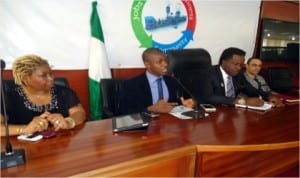Business
ANLCA Warns Against Collapse Of Warri Port
The National Financial Secretary, Association of Nigerian Licenced Customs Agents (ANLCA), Mr. Johnbull Oribhabor, has appealed to the Federal Government to take adequate measures to save the Warri Port from collapse.
Oribhabor made the appeal on Monday in Warri in an interview with newsmen.
He said that the Warri Port, which used to be a beehive of commercial activities in the past, had almost gone extinct due to prolonged neglect by successive governments.
Oribhabor said that the association had written to successive governments on the need to dredge the waterways leading to the Warri Port to revive the dwindling economic activities at the port.
“ANLCA has made frantic efforts by writing successive governments on the importance of Warri Port to the economy and the need to develop it for optimum performance.
“The Warri Port has been inactive over the years and at various conferences and seminars, the association has consistently cried out on the need to give Warri Port the desired attention, but our efforts have been in vain.”
According to him, Escravos water, which is the only entrance into the Warri Port from the Atlantic Ocean, has not been dredged in the last 20 years.
He said that about 65 per cent of activities in the oil and gas industry which included drillings, survey-piping and wire line jobs occurred mainly between Escravos and associated creeks leading to Warri Port.
Oribhabor said that the continuous usage of the waterways by drilling rigs, houseboats and jack-ups had created silts on the water beds resulting in extreme shallowness of the Warri Rivers.
“Big vessels cannot come into shallow waters, hence the need to regularly dredge same so as to increase its depth and draft.”
Oribhabor stressed the need for the Warri Port to be given the same attention being accorded to both the Lagos and Port Harcourt ports.
“Ships suffer congestion in Lagos and Tin Can Island ports; they get diverted to neighboring countries, yet Warri port is idle.
“Senate Committee on Transport visit Lagos/Tin can regularly, they never visit Warri Port and when any team visits they chat with port manager and depart,” he said.
Oribhabor decried the high freight charges on cargoes, adding that they were capable of scaring vessels and port users away from doing business in the Warri Port.
He urged government to adjust the freight charges.
He said that the facilities at the Warri Port were relatively new, functional and did not require refurbishment.
“All it needs is to dredge her water ways.”
Business
PENGASSAN Tasks Multinationals On Workers’ Salary Increase

Business
SEC Unveils Digital Regulatory Hub To Boost Oversight Across Financial Markets

Business
NAFDAC Decries Circulation Of Prohibited Food Items In markets …….Orders Vendors’ Immediate Cessation Of Dealings With Products

Importers, market traders, and supermarket operators have therefore, been directed to immediately cease all dealings in these items and to notify their supply chain partners to halt transactions involving prohibited products.
The agency emphasized that failure to comply will attract strict enforcement measures, including seizure and destruction of goods, suspension or revocation of operational licences, and prosecution under relevant laws.
The statement said “The National Agency for Food and Drug Administration and Control (NAFDAC) has raised an alarm over the growing incidence of smuggling, sale, and distribution of regulated food products such as pasta, noodles, sugar, and tomato paste currently found in markets across the country.
“These products are expressly listed on the Federal Government’s Customs Prohibition List and are not permitted for importation”.
NAFDAC also called on other government bodies, including the Nigeria Customs Service, Nigeria Immigration Service(NIS) Standards Organisation of Nigeria (SON), Nigerian Ports Authority (NPA), Nigerian Maritime Administration and Safety Agency (NIMASA), Nigeria Shippers Council, and the Nigeria Agricultural Quarantine Service (NAQS), to collaborate in enforcing the ban on these unsafe products.
-

 Business4 days ago
Business4 days agoCBN Revises Cash Withdrawal Rules January 2026, Ends Special Authorisation
-
Business4 days ago
Shippers Council Vows Commitment To Security At Nigerian Ports
-

 Business4 days ago
Business4 days agoFIRS Clarifies New Tax Laws, Debunks Levy Misconceptions
-

 Business4 days ago
Business4 days agoNigeria Risks Talents Exodus In Oil And Gas Sector – PENGASSAN
-

 Politics4 days ago
Politics4 days agoTinubu Increases Ambassador-nominees to 65, Seeks Senate’s Confirmation
-
Sports4 days ago
Obagi Emerges OML 58 Football Cup Champions
-
Business4 days ago
NCDMB, Others Task Youths On Skills Acquisition, Peace
-

 Sports3 days ago
Sports3 days agoFOOTBALL FANS FIESTA IN PH IS TO PROMOTE PEACE, UNITY – Oputa


